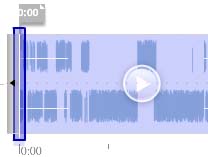 In an era where the smartphone you carry in your pocket can perform an acrobatic variety of digital stunts (most a whole lot more impressive than the Stupid Human Tricks of late night TV), the most “native” functionality of the phone itself, namely the transmission and processing of your actual verbal conversation, has been, well, not too smart.
In an era where the smartphone you carry in your pocket can perform an acrobatic variety of digital stunts (most a whole lot more impressive than the Stupid Human Tricks of late night TV), the most “native” functionality of the phone itself, namely the transmission and processing of your actual verbal conversation, has been, well, not too smart.
The “workflow” processing or recording of a phone call that (as Call Centers around the world like to tell us), are for “quality assurance purposes,” have been strangely missing from the equation. (If your credit card company can record your spoken words, why can’t you?).
At one level, it’s gratifying, I suppose, to know that your voice can train your bank’s personnel, or your computer company’s tech suport staff. But what if you’d like to take ownership of your own voice for “quality control purposes,” by converting your conversations into notes, action items, selected excerpts or complete textual transcriptions of your most idea-potent phone calls? With technology from a company called Cogi, you can do exactly that! Indeed, Cogi has recognized that the smartest part of the smartphone is the person who is speaking into it, namely you!
Is recording of phone calls legal? There are laws on the books in many states that spell out guidelines for obtaining the consent of another party being recorded on a call. These are complied with by Cogi’s system in several ways, one of which is an optional announcement. Frankly, I have to wonder if I am the the only person who sees these laws as a bit outmoded when Google can translate the speech left on a Google Voice message into text and email it to you replete with relevant advertising surrounding it . Or when the data footprints you leave across the Web can be recorded in the background without your realizing it. Why must you plead for the right to record your own conversation? You shouldn’t!

What makes Cogi unique as a management tool are three essential things for turning important communication into effective collaboration.
First, Cogi is instantaneous. You can select key excerpts of a conversation or a meeting to transcribe into minutes, memory notes or a “to-do” list during a conversation in real time by marking it on your keypad. Or, once the call has ended, you can instantly click-and-drag through a visual soundtrack timeline and quickly label parts of a conversation to be reviewed as audio notes or transcribed into text. Compare this editing process to handling a digital or analog recording on tape that needs to be loaded into transcription hardware or software and then enter a queue that could last several days, at which point your memory has already faded. The timeliness of Cogi is invaluable.
Secondly, whether you choose to transcribe either small excerpts, or the entirety of a phone call or meeting, the notes are turned around and sent back to you within a few short hours and with a high degree of accuracy. Cogi accomplishes this by using both automated voice-to-text translation technologies combined with human edited review teams. For security and confidentiality purposes, the recordings are also segmented so that Cogi staff are only privy to a segment of a recording, not to the duration of an entire recording,
Thirdly, Cogi makes it easy to initiate the “idea-capture” process for any conversation worth remembering whether you are at your desk or traveling and using a smartphone. Just call your assigned Cogi phone line and Cogi will begin recording the call on demand. The Cogi iPhone app could possibly be the most productive tool on your smartphone if putting your verbal transactions on paper is important to you.
Cogi offers three service plans starting at $4.95 monthly for 3 months of storage and a few transcription minutes to $24.95 per month for unlimited storage and 20 transcription minutes or $49.95 per month for unlimited storage, up to 900 call minutes, and 60 transcription minutes. For anyone who has paid the “going rate” for professional transcription services, the paradigm shift is dramatic.
Ultimately, Cogi claims to be able to give you back at least an hour of your day — a quantitative data point you can put a real price on. I prefer to think of Cogi as giving you back something even greater — the clarity of the creative ideas you convey and contemplate in your most deliberate discussions. Memories are fleeting things and so capturing ideas which can be easily lost or forgotten can mean the world. When it comes to verbal communication, that’s what makes a smartphone truly smart, and what makes a tool like Cogi truly priceless. [24×7]





















